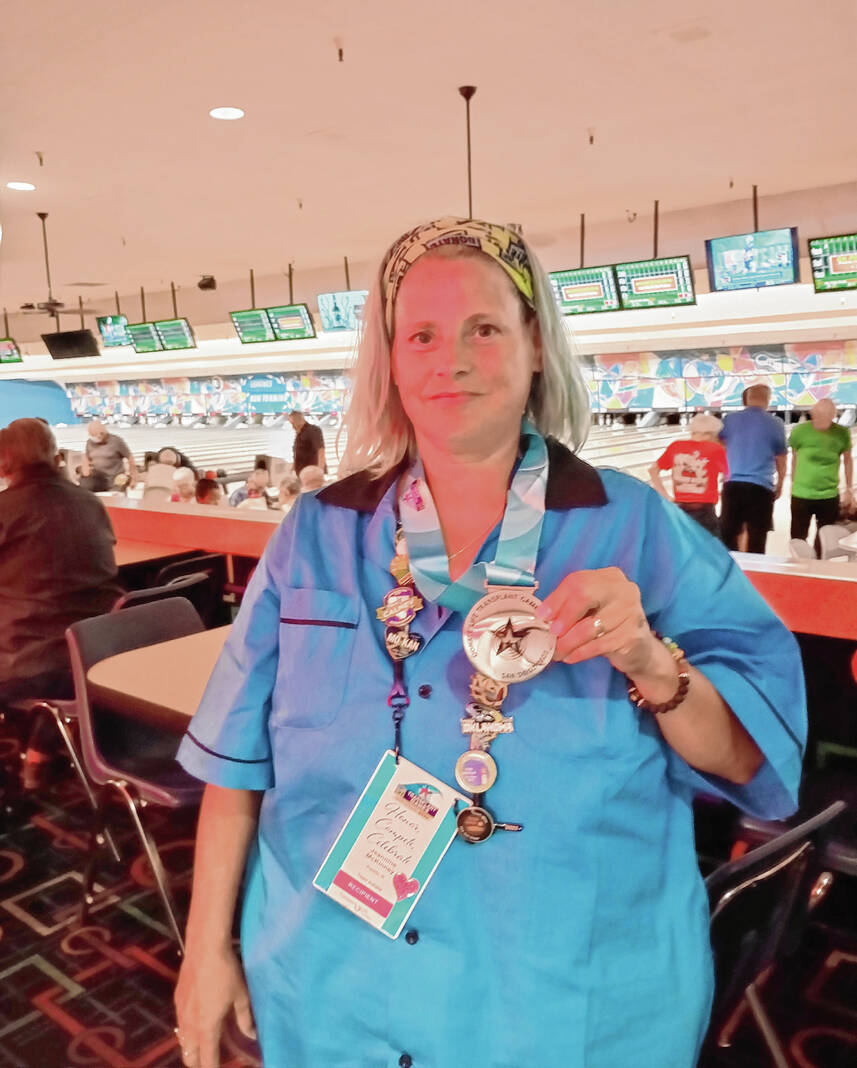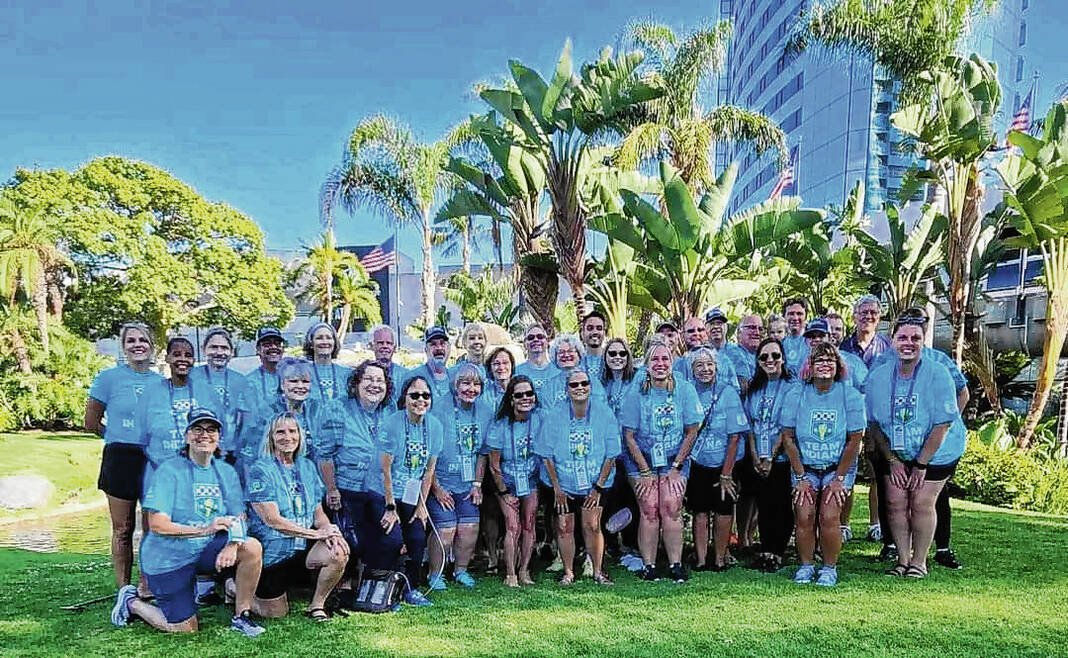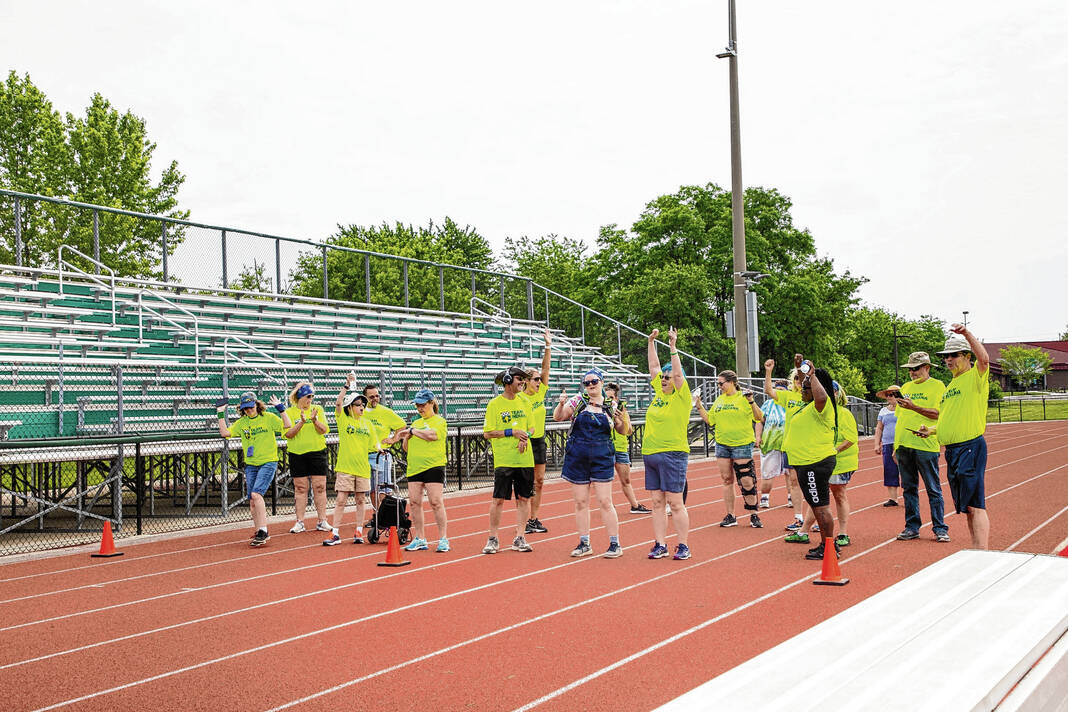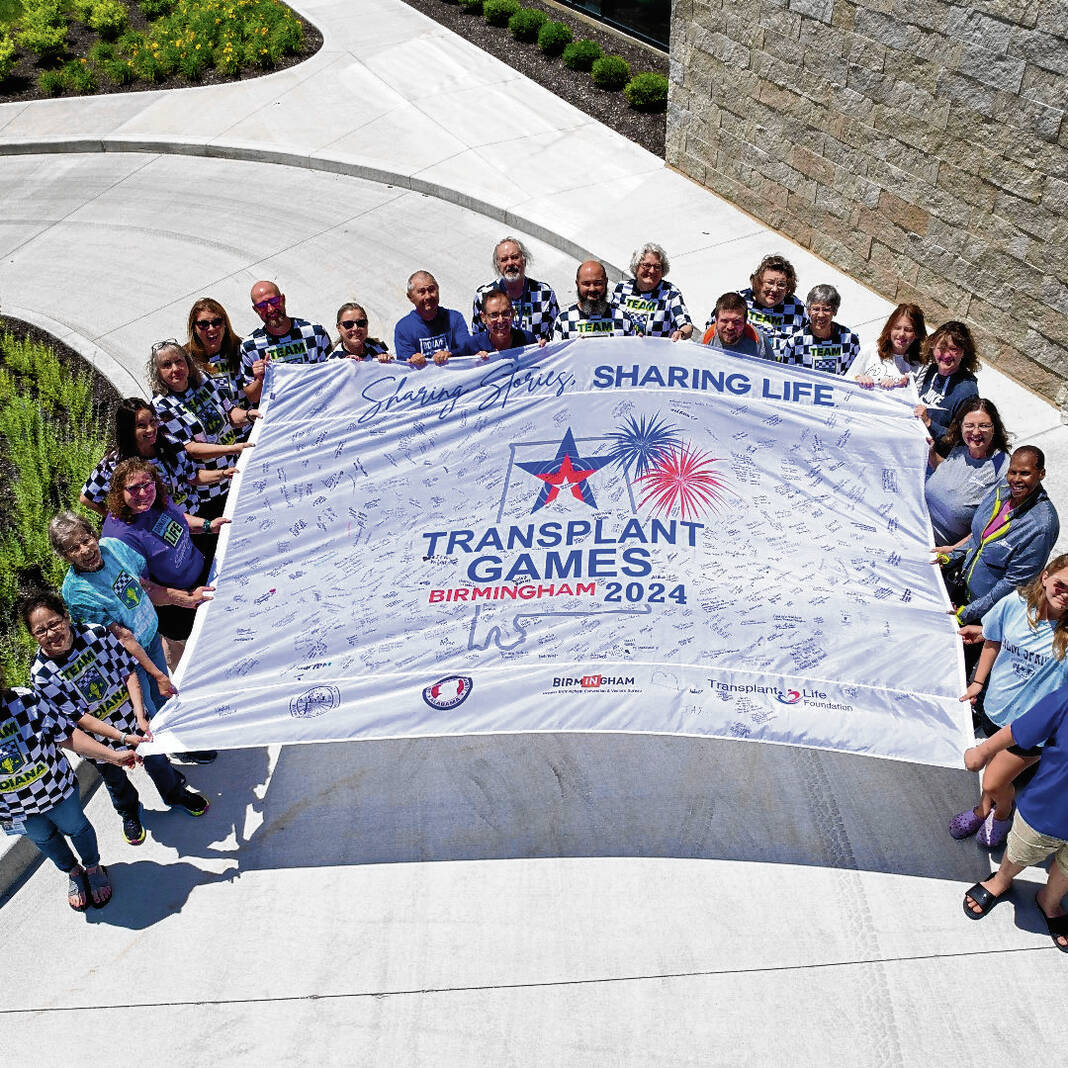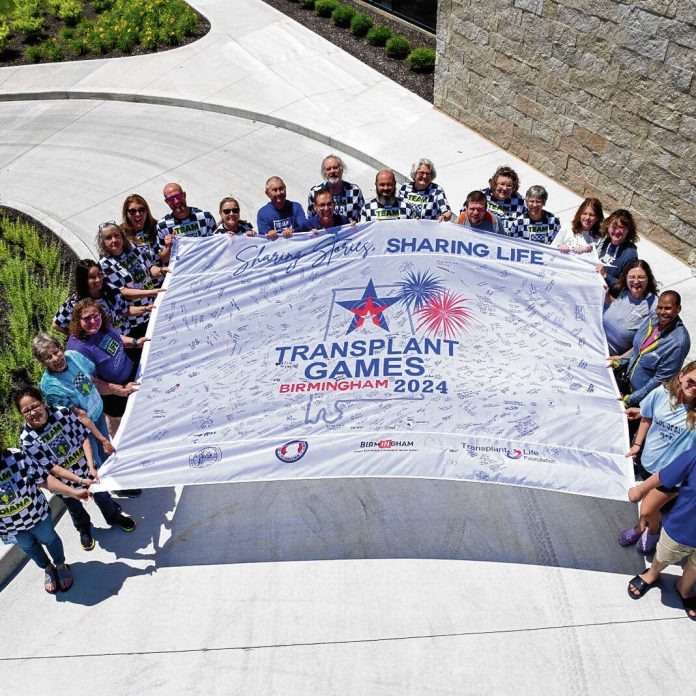
Members of Team Indiana pose together in advance of the 2024 Transplant Games of America, being held July 5 to 10 in Birmingham, Alabama.
SUBMITTED PHOTO
The thought is always in the back of her mind.
Do it for your donor hero, Jeannine McKinney thinks.
The Franklin resident is a multi-organ transplant recipient, receiving a lifesaving liver, pancreas, intestine and stomach 14 years ago. Without someone’s selfless decision to be an organ donor, she wouldn’t be competing in the 2024 Transplant Games of America this week; she likely wouldn’t be alive.
So McKinney always has her hero on her mind.
“It makes me feel like I’m honoring him, that I’m living my life for him. I’m able to do things like this because of him; if it wasn’t for him and his family, I wouldn’t be able to,” she said.
McKinney has joined 52 other Indiana residents to compete with Team Indiana in the Transplant Games, held this year in Birmingham, Alabama, from today to July 10. The games, held every two years, bring together thousands of organ transplant recipients, living donors, donor families, caregivers and more in support of organ, tissue and cornea donation and transplantation.
For six days, participants will compete against each other while bonding over their transplant connection.
“It’s a nice time for them to all gather. Some of the people can be really competitive, but when it boils down to it, it’s everybody gathering and celebrating the fact they can even be there because of donation,” said Corinne Osinski‑Carey, community outreach coordinator and registry specialist for Indiana Donor Network. “Whether that’s playing darts or cycling the 20K, they’re all there for that reason.”
McKinney never expected to be among the ranks of transplant recipients. The first warning signs that something was wrong came in 1999, when she was pregnant with her youngest son.
She had been diagnosed with Caroli disease, a rare disease that causes the bile ducts in the liver to be wider than usual. The condition can cause bile duct stones to form, which can lead to a variety of problems down the line, including damage to the veins within the liver.
The issue grew progressively worse. Finally, about a year after her son was born, she had surgery to remove half of her liver. For a few years, McKinney’s condition improved. But she started suffering intense flare-ups of gallstones, and everything seemed to gradually get worse.
In 2010, doctors informed her she needed a liver, pancreas, stomach and small intestine transplant.
“I knew I’d have to have a transplant for a long time, until I was listed in 2010,” she said. “I didn’t really worry about it too much, I just did my daily routine of taking care of my kids. I knew I was sick, but I didn’t feel sick. Basically, I just had to do what I needed to get by day to day.”
McKinney waited more than a year on the transplant list, until she was informed that a match had been found. She quickly rushed to surgery at IU Health and Medical Center in Indianapolis on June 15, 2011.
McKinney doesn’t know who her donor is. The only information she was given was it was a 12-year-old boy from Ohio. She’s reached out through Indiana Donor Network, but has not heard back from the family about him, which she is sympathetic about.
“My youngest son was 11 years old at the time, so I kind of understand why they’d be hesitant,” she said.
Still, the memory of her donor hero is on her mind constantly — as it will be during the Transplant Games this week.
The Transplant Games of America were created in 1990 to raise awareness about organ donation and transplantation, and highlighted the potential of the “gift of life.”
“We can talk about donation and transplant until we turn blue. But to see people actually out there, letting people see that organ donation does save lives and gave these people this opportunity, it helps people get over that apprehension about donation,” Osinski‑Carey said.
The first games, held in Indianapolis, drew about 400 participants. Now, thousands of competitors take part — organ, eye, and tissue recipients as well as living donors, donor families, patients waiting for transplant, and professionals from the donation and transplant world. People square off in everything from swimming to golf to track and field, as well as poker, table tennis and cornhole.
Held every two years in host cities throughout the United States, this year’s games include teams from 40 states as well as others coming from around the world.
“It’s basically like the Olympics for people who have been impacted by organ donation and transplant,” Osinski‑Carey said.
McKinney will be participating in doubles and singles bowling, darts and table tennis, in addition to taking part in the 5K run/walk. She became aware of the games after becoming active as a volunteer with Indiana Donor Network, then known as Indiana Organ Procurement Organization, following her transplant.
Through the organization, she learned about the Transplant Games of America.
“I met with a couple of friends that I made through the Indiana Donor Network, trying to figure out what was going on, and after hearing about the Transplant Games, thought it was one way I could honor my donor,” she said.
McKinney traveled to San Diego, California, in 2022 with the 18-member Team Indiana to take part in the Transplant Games. The experience was incredibly rewarding, as she won a silver medal in the women’s doubles bowling competition. More importantly, she bonded with her fellow Hoosier teammates and others in the transplant community from around the country.
“I got to know other people in the same situation, who had come together from all over the United States. It was a really neat experience knowing that I’m not the only one who’s gone through this,” she said. “I made some new friends where we all have a common experience as recipients, having to get tested and bloodwork and medication. It’s like our own little support group.”
The Games also offered a chance for McKinney to interact with donor families, who offered another perspective on the transplant experience.
“It kind of helped me understand what they go through on their end of having someone donate their organs once they’ve passed,” she said.
Through her participation in the Transplant Games, McKinney hopes to use the platform to raise awareness about organ donation and its importance. Her life is a testament to the impact it can make.
And because anyone can sign up to become an organ and tissue donor, regardless of age or medical condition, she wants to spread the word.
“It’s a gift that you can give to somebody that can extend their life, so they can do other things and experience. I got to see my kids and my family grow, and be there for them. I wouldn’t be there for my kids if not for organ donation,” she said. “In my opinion, there’s really no reason not to donate.”
AT A GLANCE
Organ donation
What kinds of organ donation are there?
Living donation: Kidney and liver patients who can receive a living donor transplant can receive an organ much sooner, often in less than a year.
Deceased donation: Deceased organ, tissue and eye donation is the process of giving an organ (or part of an organ), tissue or eye at the time of the donor’s death, for transplantation to another person. Deceased donors can provide kidneys, liver, heart and valves, lungs, pancreas, intestines, bones, veins, corneas, islet cells and tendons.
Vascularized Composite Allografts: These procedures involve transplant of multiple structures that may include skin, bone, muscles, blood vessels, nerves and connective tissue. The most commonly known type of these are for hand and face transplants.
Who can be an organ donor? Anyone. There are no age or race restrictions for donation, and regardless of medical history, you can sign up to be a donor.
To register to be an organ donor, go to donatelifeindiana.org/show-your-support/sign-up/ and fill out the required form. People also can register to be a donor at any Indiana Bureau of Motor Vehicles location.
To inquire about living donation, go to iuhealth.org/find-medical-services/living-kidney-donation or iuhealth.org/find-medical-services/living-organ-donation.
Source: Donate Life Indiana


